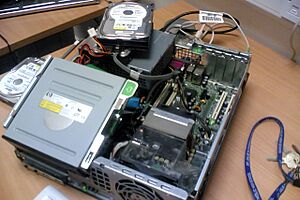Disk cloning facts for kids
Disk cloning is like making an exact copy of everything on a computer's storage drive. This includes hard disks or solid state drives. It's not just copying files; it copies the way the drive is organized, too. People clone drives for many reasons. These include making backups, setting up many computers at once, or saving information for investigations. Sometimes, cloning saves the copy as a special file called a disk image.
Contents
How Disk Cloning Works
Disk cloning works by copying all the information from one drive, called the source drive. This can be any storage device connected to your computer. It could be connected by USB, NVMe, or SATA cables. A small amount of data is read into the computer's memory. Then, this data is written directly to another drive. This second drive is called the destination drive. Or, the data can be saved as a disk image file.
Usually, you connect the destination drive to a computer (see Fig. 1). Then, you use a special tool called a disk cloner. This tool does the actual copying. You can use a hardware cloner, which is a device that doesn't need a computer. Software cloners are also available. They often give you more choices. For example, they can skip unwanted data to make the cloning faster. They can also change the size of the drive's sections. This lets you copy data to a new drive that is smaller than the original, as long as it has enough space for the actual data. Most hardware cloners need the new drive to be the same size as the old one. Some advanced hardware cloners can copy only the used space, but they cost more.
Why People Clone Drives
Setting Up Computers Quickly
One common reason for disk cloning is to set up many computers fast. Imagine a school or office needing to set up 50 computers. Instead of installing everything on each one, they can set up one computer perfectly. Then, they clone that computer's drive. This copy can be put onto all the other computers. This saves a lot of time. It also makes sure all computers are set up exactly the same way.
Helping Digital Investigations
Disk cloning is very important in digital forensics. This is when experts investigate digital information. They need to make sure the original data is not changed. They clone the drive to create an exact copy. This copy is then used for analysis. This way, the original evidence stays safe. Special hardware cloners are often used for this. They have a "write-blocker" feature. This stops anything from being accidentally written to the original drive.
Making Backups of Your Data
You can use disk cloning to make a backup of your data. It creates a duplicate of your drive exactly as it was when you started the copy. If your files get damaged, you can use this clone to restore them. For example, if a game save file gets corrupted, you could use the cloned backup. Many modern backup programs use cloning ideas. They often combine it with disk imaging to create good backup solutions.
Upgrading Your Computer's Drive
Cloning helps a lot when you want to upgrade your computer's storage. You can copy everything from your old drive to a new, bigger, or faster one. This means you don't have to reinstall your operating system, programs, or drivers. It's very useful when moving from older hard disk drives to faster solid state drives. Most cloning software works with many types of storage devices. Sometimes, after cloning, you might need to adjust your computer's UEFI or BIOS settings. This helps the computer start up from the new cloned drive.
Challenges with Disk Cloning
Cloning a Drive in Use
One challenge is cloning a drive that your computer is currently using. If the cloning software tries to copy the drive while it's running, data might get mixed up. This can lead to data corruption. To avoid this, the cloning tool must make sure the data stays consistent. Also, you usually can't clone your computer's main system drive while the operating system is running from it.
A common way to clone a drive in use is to start your computer from a different operating system. This is often a special version of Linux, like CloneZilla. This lets the cloning software copy the main drive without it being actively used. However, this method isn't good for servers. Servers need to run all the time and can't be shut down for cloning. Also, the special operating system needs to have the right drivers for your computer's parts.
Some server operating systems have special features to help. For example, Windows Server 2003 and newer versions include something called Volume Shadow Service (VSS). VSS takes a "snapshot" of the drive. This snapshot is like a frozen picture of the data. Any new changes are not written to this snapshot. The cloning software then copies this snapshot. This allows the drive to be backed up while the system is still running.
Cloning Can Be Slow
Disk cloning can take a long time. This is especially true for very large drives. A true clone copies every bit of data, even the empty spaces. However, many software cloners are smart. They can figure out which parts of the drive are actually being used. They only copy that used data. This makes the cloning process much faster. Some cloners also use multithreading. This means they do many copying tasks at the same time, which speeds things up even more.
See also
 In Spanish: Clonación de discos para niños
In Spanish: Clonación de discos para niños
- Comparison of disk cloning software
- Disk mirroring
- Disk image
- List of backup software
- List of data recovery software
- List of disk partitioning software
- Live USB
- Recovery disc
- Security Identifier
 | John T. Biggers |
 | Thomas Blackshear |
 | Mark Bradford |
 | Beverly Buchanan |


